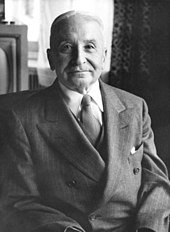Portal:Austria/Selected biography/35

Edler Ludwig Heinrich von Mises (German pronunciation: [ˈluːtvɪç fɔn ˈmiːzəs]; September 29, 1881 – October 10, 1973) was an Austrian economist, philosopher, and classical liberal who was a prominent figure in the Austrian School of economic thought. Fearing a Nazi take-over of Europe, Mises emigrated to New York in 1940. He published his magnum opus Human Action in 1949. Mises had a significant influence on the Libertarian movement that developed in the United States in the mid-20th century.
Mises was the older brother of the famous applied physicist Richard von Mises, a member of the Vienna Circle.
Mises wrote and lectured extensively on behalf of classical liberalism and is seen as one of the leaders of the Austrian School of economics. In his treatise on economics, Human Action, Mises introduced praxeology as a more general conceptual foundation of the social sciences and established that economic laws were only arrived at through the means of methodological individualism firmly rejecting positivism and materialism as a foundation for the social sciences. Many of his works, including Human Action, were on two related economic themes of monetary economics and inflation, and the differences between government controlled economies and free markets.
Mises developed the theory of the 'sovereignty of the consumer' in a free-market economy; in his view, the consumer ultimately dictates everything that happens. This argument was set out in Human Action.
